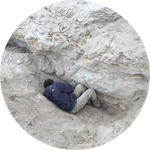About This Project
David Peterman and I are both Paleontologists who work field sites on private property in northern Texas. My research is focused on marine shark communities of the early Permian Period, while he is working primarily on Cretaceous Ammonites. We hope to visit a pair of sites that we have been to before at least one last time before exploring other localities elsewhere in the United States.
Ask the Scientists
Join The DiscussionWhat is the context of this research?
My locality ultimately fits into a study that should provide global insight into the evolution of marine vertebrate communities during the early Permian. This locality is crucial to that understanding in that it unifies sites in Russia, and in Bolivia.
The locality Dave is interested in exploring should provide samples that will help him to better understand and analyze the various types of shell ornamentation used by ammonites and how ornamentation affected the ability of the shell to move though the water. He is also interested in understanding the broad scale macroevolution of this group and their shells.
What is the significance of this project?
My research should help to illuminate marine fish communities from a period of time that is significant in that it is both poorly studied, and crucial in our understanding of the evolution of later marine faunas for the next 200 million years.
David's research outline the tools for understanding the hydrodynamics of ammonites, as well as other ammonite relatives, and if successful should provide future researchers with the tools to analyze the biomechanics of over a thousand fossil species whose movements though the ocean are still debated.
What are the goals of the project?
In the Permian, my goal is to do one final survey of the site, and bulk sample for microfossils at a few crucial layers. In the Cretaceous, Dave is hoping to collect specimens for study, as well as develop an understanding of the stratigraphy and depositional events which led to the accumulation of marine fossils at the site.
Budget
As Ph.D candidates, we both own our own tools for this project and are fairly used to self funding research and collection trips. Having this round of research funded externally will allow us to move farther north during our next found of summer field work- which would open up new sites to future study, as well as expand the scope of both of our projects.
Endorsed by
 Project Timeline
Project Timeline
We hope to complete this field work sometime before mid February of 2018, thus freeing up the summer field season for us to explore new localities in the Western Interior Seaway. We will probably leave from Wright State in early 2018, however this will all be heavily dependent on local weather conditions.
Oct 13, 2017
Project Launched
Feb 03, 2018
Arrive in Texas to begin fieldwork
Meet the Team
Ryan Shell
I originally graduated from the University of Arkansas in 2013, with a small paper in Dinosaur tracks. I've since moved my focus to marine vertebrates, and am working on manuscripts to that effect at Wright State University, where I am in the 3rd year of my Ph.D. program.
Project Backers
- 4Backers
- 7%Funded
- $59Total Donations
- $14.75Average Donation

